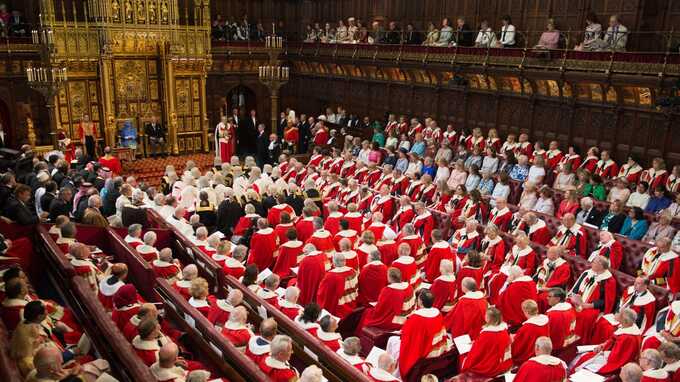Ministers have introduced plans to remove all hereditary peers from the House of Lords

Government’s bill would prevent the 92 remaining peers who inherited their titles from sitting in upper chamber
The government is proposing to banish all remaining hereditary peers from the House of Lords in the biggest shake-up of parliament in a quarter century.
The UK’s 92 remaining hereditary peers – who have inherited their titles from their parents – will lose their right to sit and vote in the upper chamber under proposals put forward by ministers on Thursday.
The move would complete reforms first made by Tony Blair’s government, which revoked the 700-year-old right of all hereditary peers to sit in the Lords in 1999. Just 92 of them, elected from the whole group, were allowed to remain until an agreement could be reached to phase them out altogether.
All 92 hereditary peers who now hold seats in the Lords are white men, and their average age is just under 70. They have continued to top up their numbers by holding byelections when one of them retires or dies.
Campaigners have long called for the system to be overhauled. In its manifesto, Labour said the continued existence of hereditary peers was “indefensible”.
The government’s bill will mean that there will no longer be any hereditary peers in the upper chamber. The earl marshal and the lord great chamberlain, who had been expected to keep their seats because of their ceremonial functions, will also be removed.
The bill is likely to become law sometime next year, and will fulfil a Labour manifesto commitment.
Nick Thomas-Symonds, minister for the constitution, said this was “a landmark reform”.
“The hereditary principle in law-making has lasted for too long and is out of step with modern Britain,” he said. “The second chamber plays a vital role in our constitution and people should not be voting on our laws in parliament by an accident of birth.”
Angela Smith, the Lords leader, said: “While recognising the valuable contributions many hereditary peers have made to parliament, it is right that this reform is being brought forward now – completing work we began 25 years ago.”
“Removing the hereditary principle from the Lords will deliver on a specific manifesto commitment. It will also help deliver on our commitment to reduce the size of the second chamber, as we bring forward further reforms.”
Smith has previously said that Labour wanted to shrink the Lords, which has about 800 members, to the same size as the Commons, which has 650. Most members of the Lords are appointed life peers, though 26 places are reserved for archbishops and bishops of the Church of England.
In its manifesto, Labour committed to introducing a retirement age of 80 for life peers and to ultimately replacing the Lords with an alternative second chamber that is more representative of the UK.
In the meantime, the government has sought to bolster its numbers in the upper chamber by appointing a series of life peers including several retiring Labour MPs. James Timpson, the former chief executive of the Timpson Group, and Patrick Vallance, the former government chief scientific adviser, have been handed peerages so that they could take up ministerial positions. More appointments are expected in the coming months.
At present there are 277 Conservative peers, 185 Labour ones and 183 cross-benchers.
The bill to abolish hereditary peers will have its first reading in the Commons on Thursday and its second reading later this autumn. Government figures expect the bill to be debated for a long time once it has made its way to the Lords.
Of the 92 hereditary peers who retain seats in the Lords, 42 take the Conservative party whip and 28 are cross-benchers. Only two are Labour peers and three are Liberal Democrats. These numbers are fixed and do not change to reflect the makeup of parliament.
The only country besides the UK with a hereditary element in its legislature is Lesotho, according to the University College London Constitution Unit.
Read more similar news:
Comments:
comments powered by Disqus
































